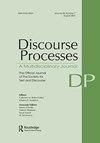男性一般代词在一般陈述句中的性别提示作用
IF 2.1
2区 心理学
Q2 PSYCHOLOGY, EDUCATIONAL
引用次数: 0
摘要
摘要一项眼动追踪实验是在荷兰语使用者(N=84,36名男性)身上进行的,荷兰语是一种介于语法语言和自然性别语言之间的语言。我们测试了在通用语句中使用阳性通用代词时,即在没有特定指称的情况下,是否会导致男性偏见。我们通过不同的概念数测试了两种类型的通用语句,假设代词zijn“his”更可能导致概念单数的男性偏见,而不是概念复数的先行词(例如,某人(概念单数)/每个人(概念复数)都有完美音高,可以快速调整他的乐器)。我们发现男性参与者表现出男性偏见,但只有概念上的单数先行词。女性参与者没有表现出男性偏见的迹象。结果表明,在概念上单一的一般语境中,一般意义上的阳性代词zijn“his”会导致男性偏见,但这进一步取决于参与者的性别。本文章由计算机程序翻译,如有差异,请以英文原文为准。
Masculine generic pronouns as a gender cue in generic statements
ABSTRACT An eye-tracking experiment was conducted with speakers of Dutch (N = 84, 36 male), a language that falls between grammatical and natural-gender languages. We tested whether a masculine generic pronoun causes a male bias when used in generic statements—that is, in the absence of a specific referent. We tested two types of generic statements by varying conceptual number, hypothesizing that the pronoun zijn “his” was more likely to cause a male bias with a conceptually singular than a conceptually plural antecedent (e.g., Someone (conceptually singular)/Everyone (conceptually plural) with perfect pitch can tune his instrument quickly). We found male participants to exhibit a male bias but with the conceptually singular antecedent only. Female participants showed no signs of a male bias. The results show that the generically intended masculine pronoun zijn “his” leads to a male bias in conceptually singular generic contexts but that this further depends on participant gender.
求助全文
通过发布文献求助,成功后即可免费获取论文全文。
去求助
来源期刊

Discourse Processes
Multiple-
CiteScore
4.30
自引率
4.50%
发文量
27
期刊介绍:
Discourse Processes is a multidisciplinary journal providing a forum for cross-fertilization of ideas from diverse disciplines sharing a common interest in discourse--prose comprehension and recall, dialogue analysis, text grammar construction, computer simulation of natural language, cross-cultural comparisons of communicative competence, or related topics. The problems posed by multisentence contexts and the methods required to investigate them, although not always unique to discourse, are sufficiently distinct so as to require an organized mode of scientific interaction made possible through the journal.
 求助内容:
求助内容: 应助结果提醒方式:
应助结果提醒方式:


